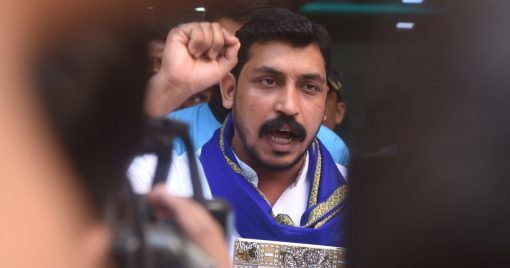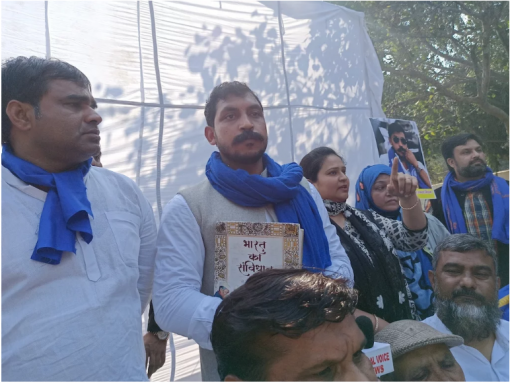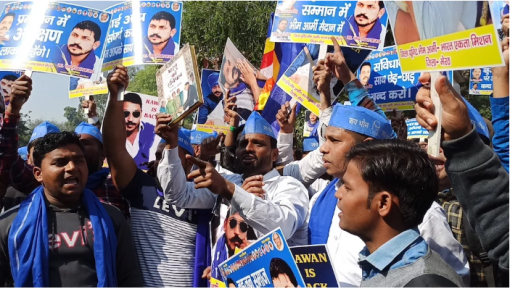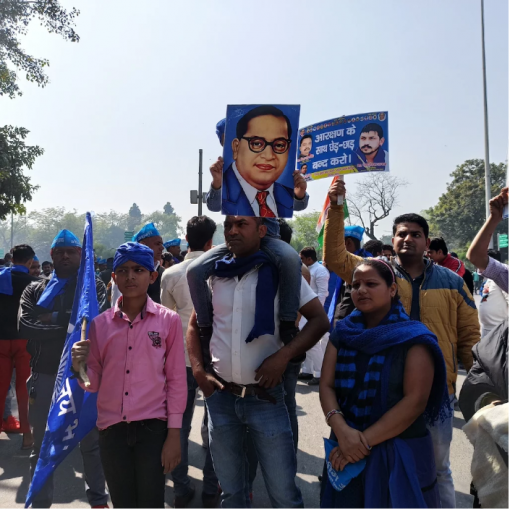
Ahead of the Bharat Bandh organised to oppose the recent Supreme Court ruling on reservations, Bhim Army Chief Chandrashekhar Azad said on Sunday that if people remain scared of laathi (stick), goli (bullet), jail and mukadme (court cases) today, their future generations will have to live a life of slavery.
Azad was addressing over 1,000 protesters at a march organised by Bhim Army in the national capital, giving a call to “save reservation in promotion, to remove CAA-NRC-NPR and to protect the Constitution”. The Ambedkarite Dalit organisation led by Azad has given a call for Bharat Bandh on February 23.
Earlier, on February 7, a two-judge bench comprising Justices L. Nageswara Rao and Hemant Gupta had observed that it’s not a fundamental right to claim reservations in promotions. The bench had said, “Article 16 (4) and 16 (4-A) are in the nature of enabling provisions, vesting a discretion on the State Government to consider providing reservations, if the circumstances so warrant.”

In this context, Azad asserted, “We will never support a law that is made after murdering the Constitution. Whether it’s [on the orders of] the government or the court, we will not let anyone touch reservations.”
He demanded that the Centre bring an ordinance and include reservations in the ninth schedule of the Constitution. “This will put an end to the judiciary’s interference when it comes to reservation. The government should give reservation to the OBCs and minorities as well along with the SC and ST community,” said Azad.
He added that a nationwide movement to sensitise the masses will be launched on April 2.
While commenting on the Citizenship (Amendment) Act ushered in by the BJP government at the Centre and the consequent National Register of Citizens (NRC), he said that the government is trying to deprive the SC, ST communities—and not just the Muslim brothers—of their voting rights.
Bhim Army’s legal advisor, Mehmood Pracha, who was also present for the march, called the February 7 ruling of the Supreme Court “anti-constitutional”.

While speaking to NewsClick, he said, “We already have filed a review petition. It is an error apparent in the face of the law as well as facts. This is in direct contravention of the basic security provided by the Constitution–fundamental right of equality. To ensure equality, there has to be positive discrimination, which is being taken away.”
In September 2018, a five-judge bench of the Supreme Court had unanimously upheld the judgment delivered in the M Nagaraj case in 2006, relating to reservations in promotions for SC/ST persons. Referring to the two instances, Pracha said, “The two-judge bench has now overruled the two larger benches, which is again, an error apparent.”
Talking about the importance of the resistance in form of the protests, he said, “The battle in the Supreme Court is only 5%. Ninety-five per cent is going to happen on the streets. There is a need to sensitise the judges as well. […] As over 90% of the judges belong to the so-called upper castes, they need to be sensitised about the issues of the caste as long as there is no proper representation of the SCs, STs and OBCs in the high courts and the Supreme Court. So, that sensitisation process begins here.”
Harjeet Singh Bhatti, spokesperson of the Bhim Army, said that if the government does not abide by the Constitution, the people will not abide the government’s rules. “Constitution is the agreement that binds the people and the government. If they cannot protect the Constitution and keep their promise, we will too have to opt for disobedience” he said while speaking to NewsClick.

The march saw participation of protesters mainly from Delhi and Uttar Pradesh.
Gopiram Sanwariya, who had come from Narela to register his protest, said, “They (the government) do not want us to let go of the spade and pick up the pen. They thrive on the differences between us. This is why I have come here. We have to unite and fight harder to close these gaps.”
Geeta* (name changed), one of the fewer female protesters at the march, told NewsClick, “I oppose the way this government is functioning. Their unrestrained use of power—like what happened in Jamia—is appalling.”
“There are fewer women here today. But they are present in large numbers at the sit-ins like Shaheen Bagh. So, one way or another, they are part of the resistance,” she added.
Mahesh, a resident of Laxmi Nagar [Delhi], had come with his wife and two children. As his younger son, six-year-old Atish, raised slogans like ‘Jai Bheem’ and ‘Jai Valmiki, Jai Ravidas’ leading a large group, Mahesh said, “I bring my children to make them understand the importance of the Constitution. They need to understand why reservation means equality and why we have to fight for our rights.”




